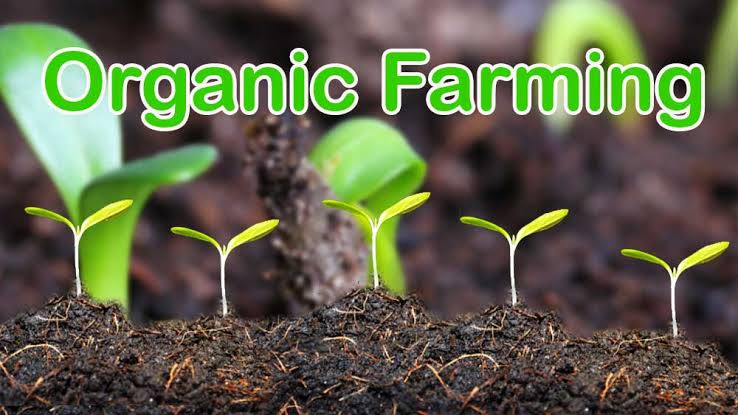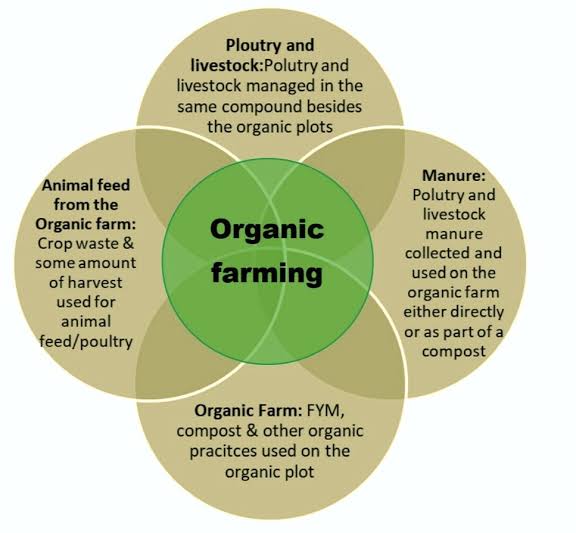Organic farming
I. Introduction
Definition of Organic Farming Organic farming is an agricultural approach that emphasizes sustainable and ecologically friendly practices. It involves avoiding synthetic fertilizers, pesticides, and genetically modified organisms, relying instead on natural processes to maintain soil fertility and prevent pests.
Historical Context and Evolution Organic farming traces its roots to early 20th-century movements reacting against the industrialization of agriculture. Over time, it has evolved, incorporating scientific principles and gaining popularity due to environmental and health concerns.

II. Principles of Organic Farming
Soil Health and Conservation Organic farming prioritizes soil as a living ecosystem. Practices include crop rotation, cover cropping, and composting to enhance soil structure, nutrient content, and water retention. This fosters a resilient and productive foundation for plant growth.
Crop Diversity and Rotation By cultivating a variety of crops and rotating them seasonally, organic farmers naturally manage pests and diseases. This approach reduces the need for chemical interventions, promotes biodiversity, and enhances the overall health of the agricultural ecosystem.
Pest and Disease Management Organic farmers utilize natural predators, crop rotation, and resistant plant varieties to control pests and diseases. Integrated Pest Management (IPM) is a key strategy, emphasizing biological control methods over chemical solutions.
Avoidance of Synthetic Chemicals One of the core tenets of organic farming is the exclusion of synthetic chemicals, such as synthetic fertilizers and pesticides. Instead, farmers use natural alternatives like compost, manure, and biopesticides, minimizing environmental impact and potential health risks.

III. Benefits of Organic Farming
Environmental Sustainability Organic farming promotes practices that reduce environmental impact, including minimized soil erosion, improved water conservation, and decreased pollution. The emphasis on natural processes contributes to overall ecosystem health.
Health Benefits Consumers are drawn to organic products due to lower pesticide residues and the absence of synthetic chemicals. Studies suggest that organic foods may contain higher levels of certain nutrients and antioxidants, potentially contributing to improved human health.
Soil Fertility and Nutrient Retention Organic practices enhance soil fertility through the use of organic matter and beneficial microbes. This results in improved nutrient retention, leading to healthier crops and sustainable agricultural productivity.
Biodiversity Conservation By avoiding monoculture and promoting diverse ecosystems, organic farming supports biodiversity. This diversity helps maintain ecological balance, contributes to resilient ecosystems, and mitigates the risks associated with single-crop agriculture.
IV. Challenges and Criticisms
Yield Concerns One criticism of organic farming is its perceived lower yield compared to conventional methods. However, advancements in organic farming techniques, such as agroecology and precision farming, are addressing these concerns.
Certification and Regulation Issues The certification process for organic farming can be complex and costly. Challenges include ensuring consistent standards globally, preventing fraud, and maintaining consumer trust in the organic label.
Economic Viability Transitioning to organic farming may involve initial costs and potential revenue fluctuations. Governments and organizations are working to provide support and incentives for farmers making the shift.
Consumer Awareness The success of organic farming is often tied to consumer awareness and understanding. Education campaigns can help consumers make informed choices, supporting the growth of the organic sector.
V. Success Stories and Case Studies
Highlighting Successful Organic Farms Examining specific organic farms and their success stories can inspire and showcase the viability of organic farming practices.
Positive Environmental Impact Case studies can demonstrate how organic farming contributes to environmental conservation, highlighting reduced chemical runoff, improved soil health, and the positive impact on local ecosystems.
Community Engagement Organic farming often fosters community involvement and support. Successful examples could include community-supported agriculture (CSA) models and partnerships between farmers and local businesses.
VI. Future Trends and Innovations
Technological Advances in Organic Agriculture Emerging technologies, such as precision farming, data analytics, and agroecology, are enhancing the efficiency and productivity of organic farming while maintaining its principles.
Integration of Permaculture Permaculture principles, emphasizing sustainable and self-sufficient ecosystems, are becoming integral to organic farming. The combination of permaculture design and organic practices enhances overall resilience.
Market Growth and Consumer Demand The increasing demand for organic products is driving market growth. Analyzing consumer trends and preferences can provide insights into the future trajectory of organic farming.
VII. Conclusion
Summarizing the Key Points Reiterating the key principles and benefits of organic farming, emphasizing its role in sustainable agriculture and addressing challenges through innovation and community support.
Emphasizing the Role of Organic Farming in Sustainable Agriculture Concluding with a call to recognize the significance of organic farming in achieving long-term agricultural sustainability and fosterin a healtheir planet
You may be interested in these jobs
-
HR Admin
Found in: Talent IN C2 - 6 days ago
Rohlig Blue Services India (RBSI) Chennai, IndiaLocation: Chennai · Subsidiary: Rohlig Blue Services India (RBSI) · Country: India · Start: asap · We are seeking a dynamic and organized HR & Admin Coordinator to join our team. This role is vital in supporting our human resources and administrative functions, ensuring the smoo ...
-
Senior Software Technical Writer
Found in: Talent IN C2 - 3 days ago
ValGenesis Chennai, India Full timeWe are looking for experienced technical writer who could join our product engineering team to produce high-quality documentation for internal and external audience. You will work collaboratively with developers, quality engineers, product managers, and quality audit analysts to ...
-

Admission Counselor
Found in: Appcast Linkedin IN C2 - 6 days ago
SkillEnable Kolkata, IndiaJob descriptionJob Title: Admission Counselor · Job description: · We are looking for a self-driven, focused individual to work as an Admission Counselor for our recognized educational institution, offering a series of different online courses. Academy of Vedic Vidya is a divisio ...
&v=024)

Comments